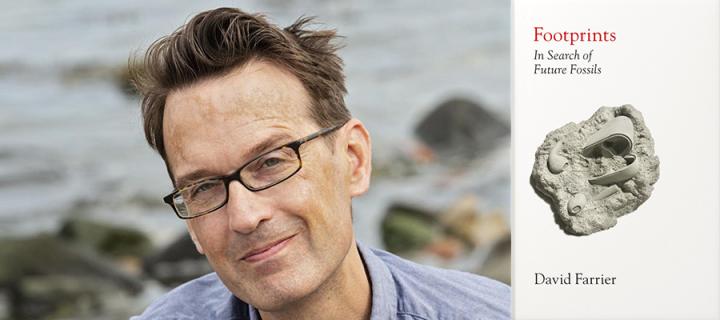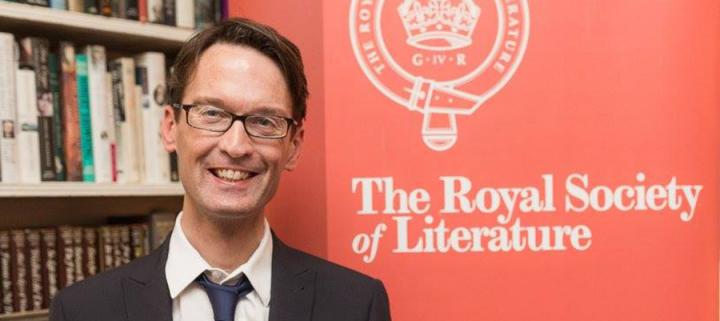Telling stories of future fossils
We talk to Royal Society of Literature award-winner, David Farrier, about why it’s important for literature to engage with place, time and the environment and about how students can get involved.
David Farrier, a Senior Lecturer in English Literature, has written his first commissioned work of non-fiction, ‘Footprints: In Search of Future Fossils’, with a £10,000 Giles St Aubyn Award from the Royal Society of Literature (RSL).

Published in March 2020, the book has been described as “a big visionary book, combining environmental sciences and world literature in a highly original and imaginative way” (Richard Holmes, Chair of the RSL Awards panel 2017), and by Gavin Francis, author of 'Adventures in Human Being', as "a signal book, and a profoundly significant one... it seeks answers to the defining question of our times: How can we be better ancestors?"
Commenting on the timeliness of the book, David says: “The oceans are rising and filling with plastic, biodiversity is crashing, extreme weather is becoming more common - all because of human action. There hasn't been a time in the history of the planet when one species has had a greater effect on the world around us than we are having right now.”
“My book looks at the evidence of how we live that will still be around in ten thousand or ten million years’ time, whether that's in the form of nuclear waste buried half a kilometre down in the bedrock of Finland to the fossilized remains of global cities like Shanghai and New York.”
Darkly, exquisitely, oh-so-carefully, David Farrier lays out the future we can see from here: the ice singing its own dissolution, the plastic without a memory that will last for eternity, the deepest ocean and the highest air which will remember our carbon traces millions of years to come. His book is a brilliant and surprisingly beautiful requiem for what we have lost, but also, crucially, what we might save from the wreckage.
The importance of telling stories

David’s work on future fossils, which has previously appeared in magazines including ‘Aeon’ and ‘The Atlantic’, engages with the idea of the 'Anthropocene'.
He explains: “The Anthropocene is a term used by many scientists and scholars to describe the scale of [environmental] changes, all of which have their origin in how we choose to live our lives.”
“These changes are effectively permanent, at least from a human perspective: plastic can take thousands of years to break down, and in the right geological conditions can even be preserved long enough in the ground to begin to turn back into oil; measured against previous planetary extinction events, it could be ten million years before the earth is as biodiverse as it was in 1950.”
“Literature doesn't provide us with an easy solution to the Anthropocene's wicked problems, but I believe telling stories about what's changing and what will be left behind can help people to engage with issues that otherwise seem too big to grasp.”
What have we done, what are we doing, and in what sort of state are we leaving our home? David Farrier’s natural history of the junkyard Anthropocene is devastating in its answers to these questions, a precocious elegy and a mind-bender that will make you cry like any newborn baby.
Student involvement in Environmental Humanities
In addition to teaching English Literature, David co-convenes the Edinburgh Environmental Humanities Network, an interdisciplinary research network established in 2013 to address the current environmental crisis.
Commenting on opportunities for student involvement, he says: “There's lots going on at Edinburgh, and the best place to start is with the Network. We host visiting academics from around the world, organise talks and a (semi) regular reading group.”
“In terms of teaching and student-led research, there’s ‘Green Thoughts’, my postgraduate option course in contemporary environmental writing, and a growing community of Environmental Humanities PhD students in the School of Literatures, Languages and Cultures”.
“Across the University, there are also Environmental Humanities courses on offer in Edinburgh College of Art, and in the Schools of Divinity and Geography”.
'Footprints: In Search of Future Fossils' is published in the USA by Farrar, Straus and Giroux and in the UK by 4th Estate. You can attend its UK launch at Blackwell's, Edinburgh on Tuesday 17th March 2020.
Book your free ticket to the launch on the Blackwell’s website
Related links
Read about David's award on the Royal Society of Literature website
Find out more about the Edinburgh Environmental Humanities Network on the EEHN website
This article was orignially published in April 2018 and revised and republished in February 2020 to mark the launch of Future Fossils.

